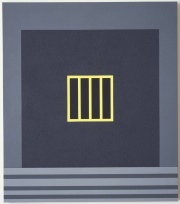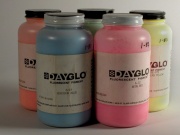Difference between revisions of "Fluorescent paint"
(username removed) |
|||
| (4 intermediate revisions by 3 users not shown) | |||
| Line 1: | Line 1: | ||
| − | [[File: | + | [[File:1992.481-SC16426.jpg|thumb|Painting with Day-glo acrylic<br>MFA# 1992.481]] |
== Description == | == Description == | ||
| + | [[File:dayglow.jpg|thumb|Day-Glo® fluorescent paint]] | ||
| + | Any paint that contains a luminous pigment. Fluorescent colorants appear to glow or luminesce in daylight because they emit greater than 100% the visible incident radiation. Additionally, many of these colorants glow in ultraviolet or black lighting. Fluorescent paints usually contain a base of calcium, strontium, or barium sulfide that is spiked with traces of other metal salts. These salts absorb energy from light and remit it in the form of photons. New fluorescent dyes are also used. Fluorescent paints were first sold in 1934. They are used in operating rooms to brighten the light intensity, on road signs to make them more visible in the dark, in advertising to make boxes and adds appear brighter and as a decorative paint. One popular brand, Day-Glo® paints, produces decorative colors in bright yellow, orange, red, blue, and green. These paints are not lightfast enough for use in fine art painting. Several color changes can occur with time, such as decreases in the intensity of the fluorescence and/or fading of the colorant (Ellis, McGlinchey and Chao 2000). | ||
| − | + | See also [[luminous paint]], [[phosphorescent paint]], and [[fluorescent dye]]. | |
| − | |||
| − | |||
| − | |||
== Synonyms and Related Terms == | == Synonyms and Related Terms == | ||
tinta fluorescente (Port.) | tinta fluorescente (Port.) | ||
| − | Examples | + | Examples: Day-Glo® paint [Day-Glo Color Corporation, Cleveland]; Rad-Glo [Radiant Color N.V, Houthalen]; neon paint; psychodelic paint; luminous paint; Dayglo (sp); Dayglow (sp) |
| − | == | + | == Risks == |
| − | Generally nontoxic. | + | * Generally nontoxic. |
| − | == | + | ==Resources and Citations== |
| − | M.Holben Ellis, C.McGlinchey, Esther Chao, "Daylight Fluorescent Colors as Artistic Media", 2000. | + | * M.Holben Ellis, C.McGlinchey, Esther Chao, "Daylight Fluorescent Colors as Artistic Media", 2000. |
| − | + | * Golden Artist Colors, Fluorescent Colors, 1998, website:[http://www.goldenpaints.com/fluores.htm www.goldenpaints.com/fluores.htm] | |
| − | * | + | * G.S.Brady, ''Materials Handbook'', McGraw-Hill Book Co., New York, 1971 Comment: p. 472 |
| − | * | + | * Ralph Mayer, ''A Dictionary of Art Terms and Techniques'', Harper and Row Publishers, New York, 1969 (also 1945 printing) |
* ''A Glossary of Paper Conservation Terms'', Margaret Ellis (ed.), Conservation Center of the Institute of Fine Arts, New York City, 1998 | * ''A Glossary of Paper Conservation Terms'', Margaret Ellis (ed.), Conservation Center of the Institute of Fine Arts, New York City, 1998 | ||
Latest revision as of 15:01, 21 August 2022
Description
Any paint that contains a luminous pigment. Fluorescent colorants appear to glow or luminesce in daylight because they emit greater than 100% the visible incident radiation. Additionally, many of these colorants glow in ultraviolet or black lighting. Fluorescent paints usually contain a base of calcium, strontium, or barium sulfide that is spiked with traces of other metal salts. These salts absorb energy from light and remit it in the form of photons. New fluorescent dyes are also used. Fluorescent paints were first sold in 1934. They are used in operating rooms to brighten the light intensity, on road signs to make them more visible in the dark, in advertising to make boxes and adds appear brighter and as a decorative paint. One popular brand, Day-Glo® paints, produces decorative colors in bright yellow, orange, red, blue, and green. These paints are not lightfast enough for use in fine art painting. Several color changes can occur with time, such as decreases in the intensity of the fluorescence and/or fading of the colorant (Ellis, McGlinchey and Chao 2000).
See also Luminous paint, Phosphorescent paint, and Fluorescent dye.
Synonyms and Related Terms
tinta fluorescente (Port.)
Examples: Day-Glo® paint [Day-Glo Color Corporation, Cleveland]; Rad-Glo [Radiant Color N.V, Houthalen]; neon paint; psychodelic paint; luminous paint; Dayglo (sp); Dayglow (sp)
Risks
- Generally nontoxic.
Resources and Citations
- M.Holben Ellis, C.McGlinchey, Esther Chao, "Daylight Fluorescent Colors as Artistic Media", 2000.
- Golden Artist Colors, Fluorescent Colors, 1998, website:www.goldenpaints.com/fluores.htm
- G.S.Brady, Materials Handbook, McGraw-Hill Book Co., New York, 1971 Comment: p. 472
- Ralph Mayer, A Dictionary of Art Terms and Techniques, Harper and Row Publishers, New York, 1969 (also 1945 printing)
- A Glossary of Paper Conservation Terms, Margaret Ellis (ed.), Conservation Center of the Institute of Fine Arts, New York City, 1998

